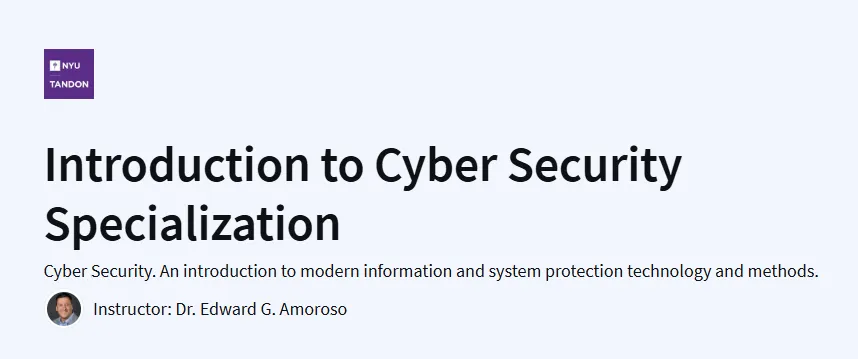What you will learn in Introduction to Cyber Security Specialization Course
This specialization provides a comprehensive introduction to modern information and system protection technologies and methods.
Designed to cultivate a deep understanding of cybersecurity, the program aims to instill a lifelong passion and appreciation for the field.
Learners will explore topics such as security engineering, cyberattacks, network security, and computer networking. .
- The curriculum emphasizes foundational issues, encouraging students to develop the habit of properly assessing and improving cyber risk posture in real computing, networking, and software systems.
- Specialized interviews with industry partners are included to connect cybersecurity concepts to real-world business experiences..
Program Overview
Introduction to Cyber Attacks
⏱️ 4 weeks
This course provides a baseline understanding of common cybersecurity threats, vulnerabilities, and risks.
Understand the construction and application of basic cyber attacks.
Explore examples such as Unix kernel hacks, Internet worms, and Trojan horses.
Analyze network attacks like distributed denial of service (DDoS) and botnet attacks.
Familiarize with analytic models like the confidentiality/integrity/availability (CIA) security threat framework.
Cyber Attack Countermeasures
⏱️ 4 weeks
This course introduces the basics of cyber defense, starting with foundational models and policy enforcement mechanisms.
Learn about models such as Bell-LaPadula and information flow frameworks.
Explore authentication solutions and protocols, including RSA SecureID and Kerberos.
Understand the implementation of security controls to mitigate cyber threats.
Real-Time Cyber Threat Detection and Mitigation
⏱️ 4 weeks
This course focuses on the identification and mitigation of cyber threats in real-time.
Develop skills to detect and respond to cyber threats as they occur.
Understand the tools and techniques used for real-time threat analysis.
Explore case studies of real-time cyber threat mitigation.
Enterprise and Infrastructure Security
⏱️ 4 weeks
This course delves into the security considerations for enterprise and infrastructure environments.
Understand the unique security challenges faced by enterprises.
Explore strategies for securing infrastructure components.
Learn about compliance and regulatory requirements in enterprise security.
Get certificate
Job Outlook
- The demand for cybersecurity professionals is robust and continues to grow as organizations increasingly prioritize the protection of their digital assets.
- Proficiency in cybersecurity opens opportunities in roles such as Security Analyst, Network Security Engineer, and Cybersecurity Consultant.
- According to industry reports, the cybersecurity field is expected to see significant growth, with numerous job openings and competitive salaries reflecting the specialized skill set required.
- For example, the U.S. Bureau of Labor Statistics projects a 33% growth in information security analyst positions from 2020 to 2030, much faster than the average for all occupations.
Explore More Learning Paths
Strengthen your cybersecurity knowledge and develop practical skills to protect digital systems with these curated programs designed for aspiring security professionals and IT enthusiasts.
Related Courses
Automate Cybersecurity Tasks with Python Course – Learn how to streamline cybersecurity workflows, detect vulnerabilities, and automate tasks using Python.
Cybersecurity Fundamentals Specialization Course – Build a strong foundation in cybersecurity principles, threat analysis, and defense strategies.
Cybersecurity for Business Specialization Course – Understand how cybersecurity impacts organizations and learn to implement strategies to protect business-critical data.
Related Reading
Gain deeper insight into the role of cybersecurity in modern technology and business operations:
What Is Data Management? – Learn how effective data management underpins secure and efficient digital operations.
Specification: Introduction to Cyber Security Specialization Course
|
FAQs
- The program is designed for beginners, requiring no prior experience in IT or cybersecurity.
- It provides foundational knowledge in cybersecurity concepts, threats, and preventive measures.
- The curriculum introduces tools and methodologies from scratch, ensuring accessibility for all learners.
- Hands-on projects and exercises reinforce learning and build practical skills.
- The course is self-paced, allowing learners to progress according to their schedule.
- Cybersecurity Fundamentals: Understand the basics of cybersecurity, including its importance and core principles.
- Cyber Threats and Attacks: Learn about common cyber threats such as malware, phishing, and DDoS attacks.
- Security Measures: Study various security measures like firewalls, encryption, and authentication techniques.
- Risk Management: Gain insights into assessing and managing cybersecurity risks.
- Career Pathways: Explore different career paths in cybersecurity and the skills required for each.
- The program consists of 4 courses, with an estimated completion time of 2 months at 10 hours per week.
- The courses are self-paced, allowing learners to start and finish at their convenience.
- Access to course materials is available for a specified period after enrollment.
- Learners can accelerate or slow down their learning based on personal schedules.
- The program is designed to be flexible, accommodating working professionals and students.
- Completing the specialization prepares you for roles such as Cybersecurity Analyst, IT Security Specialist, and Network Security Administrator.
- The program provides hands-on experience with industry-standard tools and techniques.
- The specialization is recognized by employers and can enhance your resume and LinkedIn profile.
- Salaries for cybersecurity professionals range from ₹5,00,000 to ₹15,00,000 annually in India.
- The program’s practical approach equips learners with skills applicable to various industries.
- The specialization includes hands-on labs and projects that simulate real-world cybersecurity tasks.
- Projects cover areas such as network security, incident response, and threat analysis.
- The capstone project allows learners to apply their skills to a comprehensive cybersecurity solution.
- Exercises are designed to reinforce learning and provide practical experience.
- Completing these projects can help build a portfolio to showcase your skills to potential employers.





